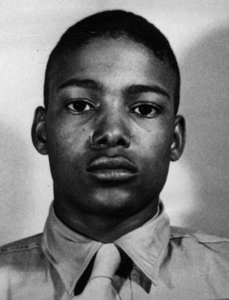Donald Morris Walker
Louisville, Kentucky
Born April 16, 1931
Private First Class, U.S. Marine Corps
Service Number 1125896
Killed in Action
Died December 7, 1950 in Korea
Private First Class Walker was a member of the Support Company, 1st Service Battalion, 1st Marine Division. He was Killed in Action while fighting the enemy in Korea on December 7, 1950. His remains were not recovered.
Private First Class Walker was awarded the Purple Heart, the Combat Action Ribbon, the Korean Service Medal, the United Nations Service Medal, the National Defense Service Medal, the Korean Presidential Unit Citation and the Republic of Korea War Service Medal.
U.S. Department of Defense
Office of the Assistant Secretary of Defense (Public Affairs)
News Release
IMMEDIATE RELEASE No. 1380-07
December 05, 2007
Marine Missing From Korean War is Identified
The Department of Defense POW/Missing Personnel Office announced today that the remains of a U.S. serviceman, missing in action from the Korean War, have been identified and will be returned to his family for burial with full military honors.
He is Private First Class Donald M. Walker, U.S. Marine Corps, of Springfield, Kentucky. He will be buried December 7, 2007, in Arlington National Cemetery near Washington, D.C.
Walker was assigned to the Service Company, 1st Service Battalion, of the 1st Marine Division deployed near the Chosin Reservoir in North Korea. On November 27, 1950, three Communist Chinese divisions launched an attack on the Marine positions. Over the next several days, U.S. forces staged a fighting withdrawal to the south, first to Hagaru-ri, then Koto-ri, and eventually to defensive positions at Hungnam. Walker died on December 7, 1950, as a result of enemy action near Koto-ri. He was buried by fellow Marines in a temporary United Nations military cemetery in Hungnam, which fell to the North Koreans in December 1950. His identity was later verified from a fingerprint taken at the time of the burial.
During Operation Glory in 1954, the North Korean government repatriated the remains of 2,944 U.S. soldiers and Marines. Included in this repatriation were remains associated with Walker’s burial. The staff at the U.S. Army Mortuary in Kokura, Japan, however, cited suspected discrepancies between the biological profile from the remains and Walker’s physical characteristics. The remains were among 416 from Operation Glory subsequently buried as “unknowns” in the National Memorial Cemetery of the Pacific (The Punchbowl) in Hawaii.
In April 2007, the Joint POW/MIA Accounting Command exhumed remains from The Punchbowl believed to be those of Walker. Although the remains did not yield usable DNA data, a reevaluation of the skeletal and dental remains led to Walker’s identification.
Michael Robert Patterson was born in Arlington and is the son of a former officer of the US Army. So it was no wonder that sooner or later his interests drew him to American history and especially to American military history. Many of his articles can be found on renowned portals like the New York Times, Washingtonpost or Wikipedia.
Reviewed by: Michael Howard

